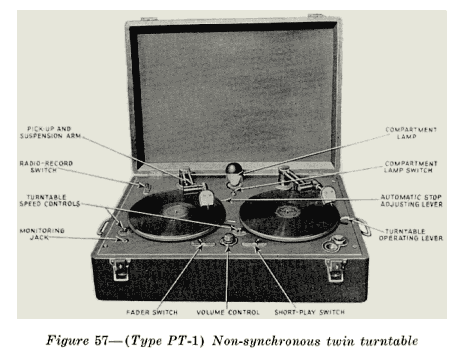Each turntable is equipped with an automatic stop for stopping the turntables at the end of the record, and a manually operated start-and-stop lever so that each turntable can be started or stopped separately. This phonograph does not have the pick-up lift knobs as in the phonograph described in section 76 but is otherwise Similar to it except in the details noted above.
Fading from one turntable to the other is accomplished by throwing the fader switch toward the table from which sound is desired.
The Type PT-6, another non-synchronous twin turntable in a steel case, is sometimes used. This turntable is similar to that shown in Figure 56.
Neither the PT-1 nor the PT-6 are supplied with individual amplifiers or loudspeakers. They are used solely in conjunction with Photophone standard theatre equipments.
These turntables may be used only with Photophone standard theatre equipment, no individual amplifiers being provided.
78. The Type PT-9 Non-Synchronous Triple Turntable. - The Type PT-9 nonsynchronous triple turntable is similar to the twin turntable described in section 77 with the addition of another turntable. The circuits are so arranged that the output of the additional turntable is connected in the circuit of the turntable which is "faded in." The purpose of the additional turntable is to provide background music or special effects such as areoplane or locomotive noises.
When the additional turntable is not in use its volume control should be in the "Off" position. The volume from the other two turntables is controlled by means of the fader potentiometer.
No special amplifier is provided, and this triple turntable may be used only with Photophone standard equipments.
8

